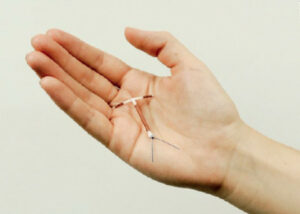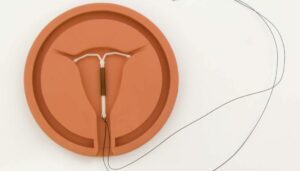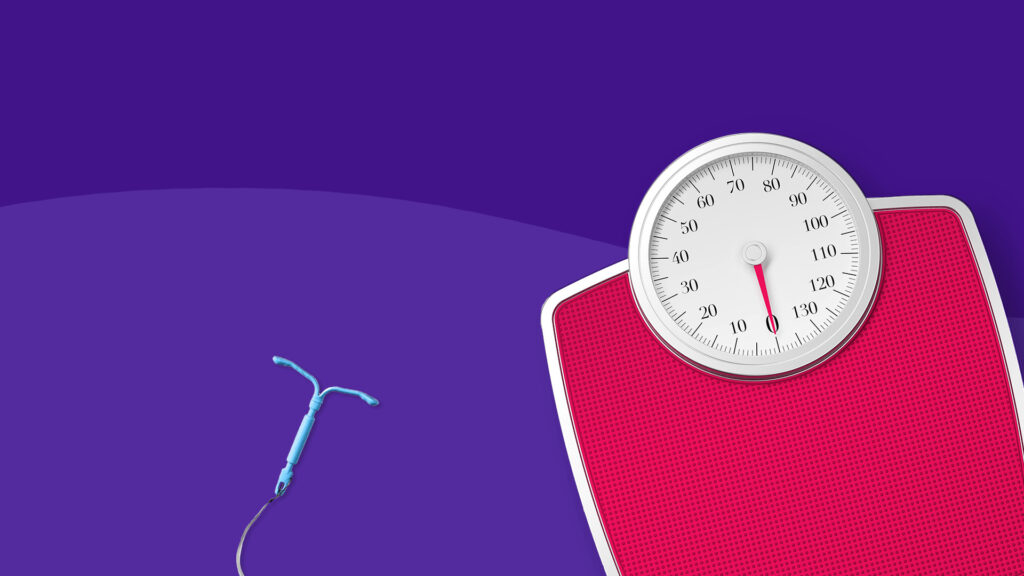If you are considering getting an IUD, you may be wondering if there is any link between the birth control device and weight gain. The answer to that question is a little complicated. There are a lot of factors that can contribute to weight gain, and it is different for everyone. In this blog post, we will take a look at some of the research on IUDs and weight gain, and give you our best advice on what to do if you are worried about putting on extra pounds.
Contents
What Is An IUD?
 IUD is the abbreviated form of Intra Uterine Device. The IUD is a small, T-shaped device that is inserted into the uterus. It is made of plastic and has a copper wire wrapped around it. The IUD works by preventing pregnancy in two ways. First, it releases a small amount of copper into the uterus, which is toxic to sperm. Second, it changes the lining of the uterus, making it less hospitable to a fertilized egg. There are two types of IUDs:
IUD is the abbreviated form of Intra Uterine Device. The IUD is a small, T-shaped device that is inserted into the uterus. It is made of plastic and has a copper wire wrapped around it. The IUD works by preventing pregnancy in two ways. First, it releases a small amount of copper into the uterus, which is toxic to sperm. Second, it changes the lining of the uterus, making it less hospitable to a fertilized egg. There are two types of IUDs:
Hormonal IUDs
These IUDs release a small amount of the hormone progestin into the uterus. Progestin is similar to the hormone that is produced naturally by the ovaries during pregnancy. The hormonal IUD thickens the cervical mucus, making it difficult for sperm to reach the egg. It also thins the lining of the uterus, making it less likely for a fertilized egg to implant.
Non-Hormonal IUDs
These IUDs do not release any hormones. They work by releasing small amounts of copper into the uterus. The copper is toxic to sperm and prevents them from reaching the egg. It also changes the lining of the uterus, making it less hospitable to a fertilized egg.
IUDs are one of the most effective forms of birth control, with a failure rate of less than one percent. They are also long-lasting, with hormonal IUDs lasting for up to five years and non-hormonal IUDs lasting for up to ten years. And they have the added bonus of being reversible, so you can get pregnant as soon as you stop using them. Also, IUDs can be used as emergency contraception if they are inserted within five days of unprotected sex.
IUD And Weight Gain
 There is a lot of misinformation out there about IUDs and weight gain. Some people believe that the hormones in hormonal IUDs can cause weight gain, but there is no scientific evidence to support this claim. In fact, one study found that women who used a hormonal IUD actually lost weight over the course of a year, while those who used a non-hormonal IUD gained weight.
There is a lot of misinformation out there about IUDs and weight gain. Some people believe that the hormones in hormonal IUDs can cause weight gain, but there is no scientific evidence to support this claim. In fact, one study found that women who used a hormonal IUD actually lost weight over the course of a year, while those who used a non-hormonal IUD gained weight.
So if hormones aren’t responsible for weight gain, what is? Well, there are a few things that could be contributing to your extra pounds.
- First of all, if you have an IUD, you may be more likely to retain water. This is because the copper in non-hormonal IUDs can cause your body to hold onto water. And, the progestin in hormonal IUDs can also lead to water retention.
- Second, your weight gain could be due to the fact that you are using an IUD as a form of contraception. This means that you are likely having less sex, and less activity in general. And, when you have sex, you may be less likely to burn calories.
- Thirdly, you may be eating more because you are worried about getting pregnant. This is especially true if you are using a non-hormonal IUD, as they are not as effective at preventing pregnancy.
- Finally, it is also possible that your weight gain has nothing to do with your IUD at all. Weight gain can be caused by a number of factors, including stress, poor diet, and lack of exercise.
These are just a few of the possible explanations for your weight gain. If you are concerned about putting on extra pounds, talk to your doctor. They can help you figure out if your weight gain is due to your IUD or something else entirely. You can also talk to a registered dietitian or nutritionist, who can help you create a healthy eating plan that will help you reach your goals.
How To Manage?
If you are concerned about IUD and weight gain, there are a few things you can do to manage your weight. Following are a few ways to manage your weight:
Eat a healthy diet
A healthy diet is important for everyone, but it is especially important if you are worried about weight gain. Eating a diet that is high in fruits, vegetables, and whole grains will help to keep your weight in check. And, avoiding processed foods and sugary drinks will also help you to avoid putting on extra pounds. Make sure to talk to your doctor or a registered dietitian if you need help with creating a healthy eating plan.
Get regular exercise
Exercise is another important part of managing your weight. It is important to get at least 30 minutes of exercise every day. And, if you can, try to get even more than that. Exercise will help to boost your metabolism and keep your weight in check. It will also help you in burning more calories than you are taking in. With regular exercise, you will be able to manage your weight and avoid putting on extra pounds.
Start a food journal
 If you are concerned about IUD and weight gain, one of the best things you can do is to start a food journal. A food journal will help you to track what you are eating and how much you are eating. It will also help you to identify any patterns that may be contributing to your weight gain. Make sure to talk to your doctor before starting a food journal, as they may have some suggestions for how to get started.
If you are concerned about IUD and weight gain, one of the best things you can do is to start a food journal. A food journal will help you to track what you are eating and how much you are eating. It will also help you to identify any patterns that may be contributing to your weight gain. Make sure to talk to your doctor before starting a food journal, as they may have some suggestions for how to get started.
Limit your alcohol intake
Alcohol can contribute to weight gain, so it is important to limit your alcohol intake if you are worried about IUD and weight gain. If you do drink, try to stick to one or two drinks per day. And, make sure to eat something before you start drinking, as this will help to slow down the absorption of alcohol into your system.
Monitor your weight
Monitoring your weight is an important part of managing IUD and weight gain. Make sure to weigh yourself on a regular basis, and take note of any changes in your weight. If you are gaining weight, make sure to talk to your doctor about it. They may be able to give you some suggestions for how to manage your weight. It is also important to monitor your waistline, as this can be an indicator of abdominal fat.
Drink plenty of water
Water is important for everyone, but it is especially important if you are concerned about IUD and weight gain. Drinking plenty of water will help to flush out your system and keep your body hydrated. It will also help you to feel full, so you are less likely to overeat. Make sure to drink eight glasses of water per day, and more if you can. You should also avoid sugary drinks, as they can contribute to weight gain.
Avoid crash diets or fad diets
Crash diets or fad diets are not a good idea if you are referring to IUD and weight gain. These types of diets can actually lead to weight gain, as they are often not sustainable in the long term. Diets like this can also lead to nutrient deficiencies, as they often eliminate entire food groups. If you are looking to lose weight, talk to your doctor about safe and healthy ways to do so.
It is also important to remember that weight gain is not necessarily a bad thing. In fact, some women may find that they feel better when they are carrying a few extra pounds. If you are concerned about your weight, make sure to talk to your doctor. They will be able to help you determine if your weight gain is due to your IUD or if it is something else entirely. And, they can give you personalized advice on how to manage your weight.
Conclusion
So, there you have it. The possible connection between IUDs and weight gain. While the research is still inconclusive, and more studies need to be done, it’s important to be aware of the potential side effects of any medication or device you’re using. If you’re concerned about IUD and weight gain, talk to your doctor about other birth control options.
There are a lot of different factors that can contribute to weight gain. And, if you are concerned about IUD and weight gain, it is important to talk to your doctor about it. They may be able to give you some suggestions for how to manage your weight. Remember, that proper diet and exercise are still the best ways to manage your weight.
If you need more help, consider contacting Mantra Care. Our team of experts can help you develop a healthy weight gain program that is tailored to your specific needs and goals. You can also get in touch with our nutrition experts and expert dietitians through our online nutrition counseling, who can guide you through the process and help you achieve your fitness goals.


